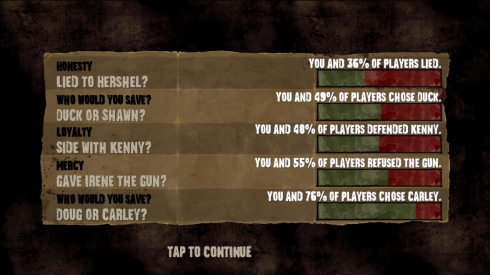(a) What sorts of rhetoric, that is to say “persuasive expressions and representations and arguments,” are present in this episode of TWD?
I will start off by saying the game sucked me in and I think I played way past chapter one. Right off the bat I was very interested in the storyline and my role in choosing how the events would unfold. I think the game was very persuasive right at the beginning by withholding information from the player. By being the man in the back of a cop car, I wanted to believe my character was wrongly convicted. Therefore, I made sure to watch what I said, and be as polite as possible, so that I could get as much information out of the officer that I could. This of course drove the storyline further, which made me more invested in who I was playing and how my character would affect those around me.
I also really liked how the game was more about unfolding the story as opposed to being a shooter game. It was fun to interact with the settings around me and learn, as opposed to constant, nerve wracking target practice. I think that by not providing a ton of details, instructions, or guides made me more inclined to keep exploring my options. That being said, the many options I was presented wether dialogue, interaction with the setting, or interacting with characters made me very aware of the image I was trying to give my character. I noticed that in the dialogue confrontations, you sometimes had more or less time to react. I came to regret a couple of my decisions for sure.
(b) Provide an example of how a “choice” you made in the game embodies this kind of rhetoric.
I think my biggest mess up when choosing my responses was when I first talked to Herschel (old farmer guy). I knew he thought I was suspicious, and I was trying my best to not give him too much information, which ended up making him even more suspicious. When the notification at the top of the screen warned me of my actions, I knew I had messed up. I felt a little guilty so I went to find him and make things right. I ended up getting a stern talking to in the barn because of this. Also, I ended up letting his son get eaten by zombies so really it was a 0/10 with him. (I decided to save the kid in hopes of having time to save his son still. Subconsciously, I knew if I had to choose just one, I should pick the kid because his family was my ride back to Macon.)
(c) In what ways are Bogost’s ideas of procedural rhetoric, “the art of persuasion through rule-based representations and interactions rather than the spoken word, writing, images, or moving pictures,” present in “A New Day”?
Bogost’s ideas are present in the aspect of being able to explore your surroundings in the game. Because you have no supplies or weapons, you know you have to search or else you will be vulnerable to attacks or wounds. There is nothing that truly tells you you have to search, but because you can interact with drawers, shelves, etc you are persuaded to look around and pick things up.
Edit: Ended up having to finish the whole game in one sitting. Here are my results: